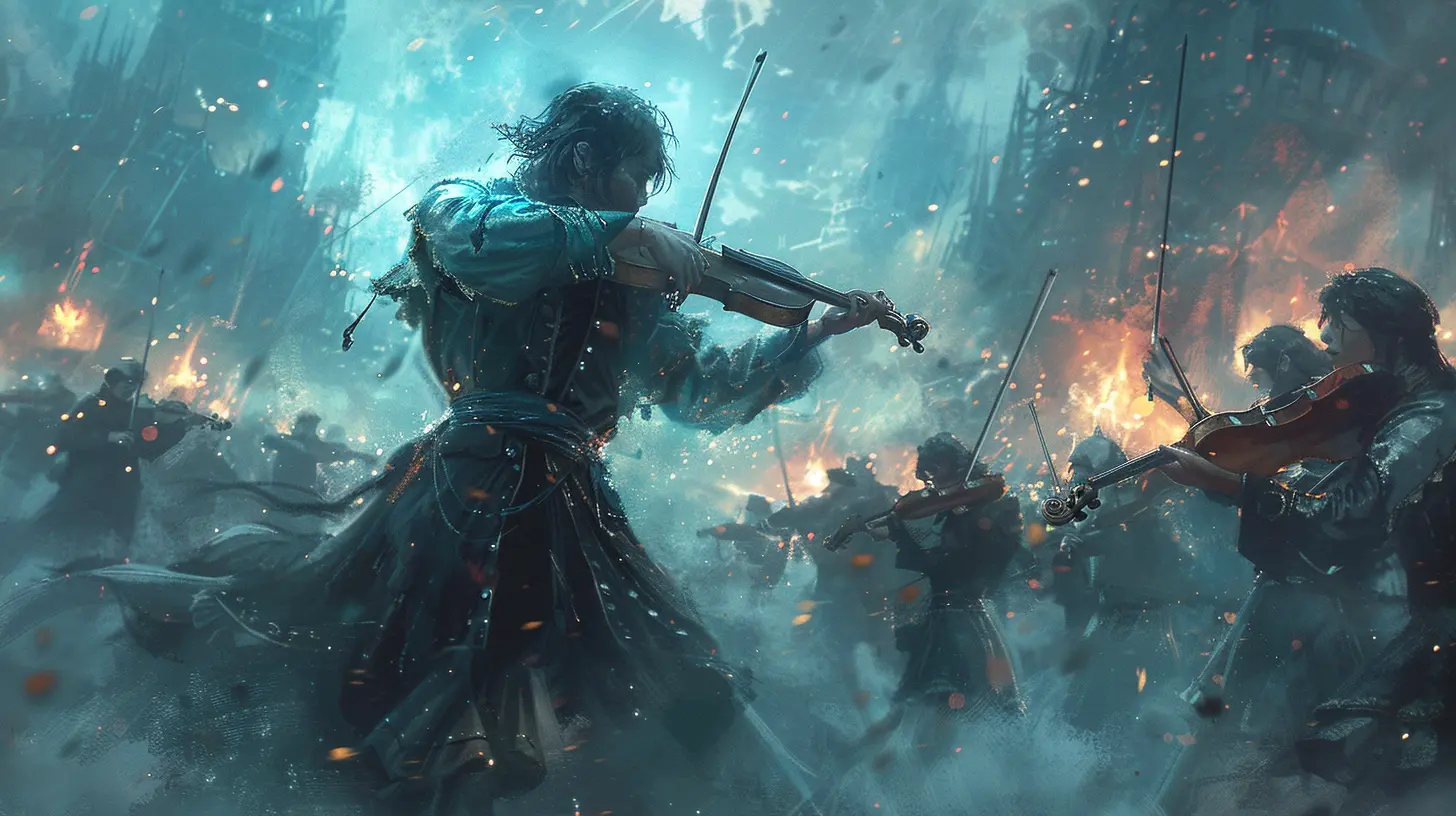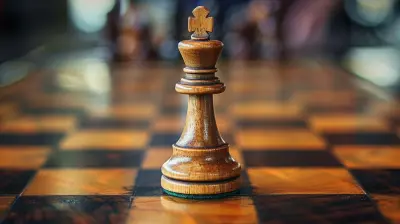Exploring Orchestral Scores in Strategy Games
8 August 2025
Ever booted up a strategy game, sat back, and just listened? That epic swell of violins as your troops march into battle, or the soft, haunting notes while you plan your next move? Yeah, that’s not just background noise—it's orchestral magic doing the heavy lifting. In the world of strategy games, music isn't just fluff. It’s storytelling, it’s emotion, and it’s a secret weapon that keeps you hooked for hours.
So today, let's peel back the curtain, crank up the volume, and dive into the powerful world of orchestral scores in strategy games. By the end of this, you’ll see why your favorite titles wouldn’t be the same without those goosebump-inducing soundtracks.
What Makes Orchestral Scores in Strategy Games So Special?
First things first—why orchestral? Why not just slap on some techno beats and call it a day?Well, orchestral music has this timeless quality. It’s cinematic. It wraps around your imagination and takes your gameplay from "fun" to "legendary." There’s a reason epic movie scenes lean on orchestras. Now, strategy games? They’re often complex, slow-burning, and brainy. You’re not just button-mashing—you’re plotting, adapting, outwitting. The music has to meet you on that level.
Orchestral scores do exactly that. They breathe life into your plans, your moral dilemmas, even your defeats. And the best part? They do it without stealing your spotlight.
The Role of Orchestral Music in Strategy Game Design
Let’s get into the meat of it. What role does orchestrated music actually play in the design of a good strategy game?1. Setting the Mood
Imagine launching into a high-stakes skirmish and hearing a gentle lullaby. Total mood killer, right?Orchestral music sets the emotional tone. It guides your feelings without saying a single word. Whether you're building a peaceful civilization or preparing for war, the score tells your brain, “Get ready, this is serious.”
2. Pacing and Flow
Strategy games are like chess on steroids. Things can get intense fast or stretch on for hours. The music helps manage that pacing. A slow, ambient track keeps your brain focused during the calm. A sudden soundtrack bomb when enemies attack? Pure adrenaline.It’s like having a musical narrator, helping you feel the tempo of battle.
3. World-Building
Honestly, no amount of lore or fancy cutscenes can beat a well-composed soundtrack in terms of immersion. The right orchestra can make a fictional world feel rich, ancient, or futuristic—whatever the devs are going for.Think of it like seasoning on a dish. A sprinkle of strings. A dash of brass. And boom—the world feels alive.
Legendary Strategy Games with Iconic Orchestral Scores
Let’s give some credit where it’s due. There are a few strategy games out there that absolutely nailed their orchestral compositions. These games didn’t just create great gameplay—they created moods that lingered long after the credits rolled.1. Total War Series
If orchestral music had a royal court in gaming, Total War would be the king and queen rolled into one. Every installment—from Rome to Three Kingdoms—features sweeping, cinematic music that evolves with gameplay.The composers behind the series understand the power of dynamics. Quiet tracks during map navigation turn into thunderous anthems the moment swords are drawn. It’s all very Shakespearean.
And let’s be honest: commanding troops while violins scream in the background? Chef’s kiss.
2. Civilization VI
Civilization is a long game. We're talking hours, maybe even days. You need music that doesn’t just loop endlessly—you need a score that grows with you.That’s exactly what Civilization VI delivers. Its orchestral score doesn’t stay static. It develops as your civilization advances—from ancient flutes and drums to full-blown orchestral symphonies. It’s musical evolution that mirrors your gameplay.
It’s like watching a baby grow up into a fully suited emperor… with a killer soundtrack.
3. StarCraft II
Okay, you might be thinking—StarCraft? Isn’t that sci-fi?Sure, it's got a high-tech, gritty vibe. But when it comes to emotional depth, the orchestral score shines. The blend of electronic elements with classical orchestration creates a sound that's uniquely tense and heroic.
Every mission feels like a turning point. That’s not an accident—it’s the music doing its job.
How Orchestral Scores Influence Player Behavior
Now here’s where it gets really interesting. Orchestral scores don’t just sit back and sound pretty. They actually influence how we play.Emotional Triggers
That minor-key cello riff? It probably made you second-guess your next move. Swelling brass? Maybe it pushed you to make a risky attack.Composers use certain instruments, scales, and rhythms to provoke emotions. You feel triumphant or terrified based on how the orchestra speaks.
Attention Span Booster
Let’s be real—strategy games can stretch your brain thin. Good music keeps you engaged. It gives your mind something to digest between tough decisions. Instead of zoning out, you stay locked in.It’s like a teacher throwing jokes into a lecture. Keeps the brain awake.
Learning Reinforcement
Games like Civilization use leitmotifs (recurring musical themes) to reinforce learning. Different leaders or eras have their own musical cues. Over time, your brain connects the sounds to specific in-game mechanics.So yeah, music is basically helping you get good.
Behind the Scenes: Composing for Strategy Games
Now, who are these geniuses creating the magic?Composers for strategy games face a tougher job than you’d think. They’re not just writing music—they’re writing reactive music. Stuff that changes with your gameplay. Stuff that doesn’t get boring after 200+ hours.
Let’s break down their process a bit:
1. Deep Game Knowledge
Before writing a single note, composers dive into the game. They learn the factions, the story arcs, the pacing, and the tone. Some even play prototypes to get the vibe right.2. Dynamic Layering
Most orchestral scores in strategy games are built in layers. You might hear a soft base melody during peace, with extra instruments kicking in during war or tension. This way, the music shifts naturally with your decisions.It’s kind of like a DJ changing the vibe of a party based on the crowd—but with violins.
3. Cultural Influence
In global games like Total War or Civilization, composers often draw from regional sounds to keep things authentic. Expect to hear Mongolian throat singing in Genghis Khan’s campaign or traditional Japanese flutes in the Shogun series.It’s history, but make it art.
The Future of Orchestral Scores in Strategy Gaming
So what’s next? Are we maxed out on musical epicness?Not even close.
AI-Generated Scores
With AI tools growing, some developers are exploring dynamic music that adjusts in real-time to your playing style. It’s like having a live orchestra that reads your mind. Spooky? Maybe. Cool? Absolutely.More Live Orchestras
There’s a growing trend of recording game soundtracks with full symphonies. It’s expensive, but the depth and quality? Unmatched. AAA studios are already hopping on this train, and honestly, indie devs aren’t far behind.VR & Immersive Audio
Imagine playing a World War II strategy game in VR with 3D audio. You turn your head and the strings drift past you like ghosts on the battlefield. That’s where we’re headed.And orchestral music will be leading the charge.
Why You Should Start Listening More Closely
Alright, so next time you fire up your favorite strategy game, do this: pause for a second. Don’t click. Just listen.Hear that slow build-up? Those subtle harmonies? That’s not filler. That’s mood. That’s narrative. That’s art.
By tuning in, you’ll not only enjoy your games more, but you’ll start to recognize the layers that make these titles so unforgettable. Music, especially orchestral scores, is the heartbeat of strategy games. Without it, you're just moving pieces on a board.
With it? You're writing your own epic saga.
Final Thoughts
Orchestral scores in strategy games are the unsung (pun intended) MVPs. They guide our emotions, elevate our experiences, and keep us coming back for “just one more turn.” Whether you're conquering the ancient world or crafting alliances in space, these stirring compositions are your ever-present allies.So next time you're immersed in your campaign, show some love to the orchestra working tirelessly behind the curtain. They might not be playable characters—but they’re definitely part of your victory.
all images in this post were generated using AI tools
Category:
Game SoundtracksAuthor:

Audrey McGhee
Discussion
rate this article
2 comments
Derek Matthews
What a beautiful exploration of how orchestral scores elevate strategy games! It's heartwarming to see the emotional depth these soundtracks bring, enhancing our connection to the stories and experiences we cherish.
October 28, 2025 at 3:33 PM

Audrey McGhee
Thank you! I'm glad you appreciated the exploration of how orchestral scores enrich our gaming experiences and deepen our emotional connections to the stories.
Maribel Estes
What a fascinating exploration! Orchestral scores truly elevate strategy games, enhancing immersion and emotional connection. It's amazing how music shapes our gaming experience. Keep up the great insights! Looking forward to more!
August 18, 2025 at 4:20 PM

Audrey McGhee
Thank you so much! I’m glad you enjoyed the exploration of orchestral scores and their impact on immersion in strategy games. Your support means a lot!


